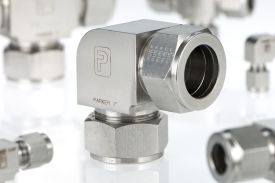A new production process based on stainless steel extrusions is raising the quality and consistency of industry-standard compression tube fittings - without ratcheting up the costs. The move comes from the leading tube fittings manufacturer, the instrumentation products division of Parker Hannifin - the global leader in motion and control technologies. The innovative technology is aimed at users in processing markets such as oil, gas and chemicals, where the need for integrity and reliability is paramount.
 New extrusion-based production process
New extrusion-based production process
"By complementing our traditional forged fittings range with versions made from extruded materials, we have been able to increase the quality and consistency of finished parts without raising costs," notes Sheldon Banks of Parker Hannifin. "The exceptional uniformity of metal grain size and shape inside extrusion-based parts means that all the new fittings possess virtually identical mechanical properties, and are in fact stronger than traditional forged parts."
Parker Hannifin believes it is the first tube fittings manufacturer to launch extrusion-based products into the mainstream twin-ferrule stainless steel compression tube fitting market, and is offering the technology on its world-leading A-LOK range. It has been able to make this move thanks to a patented extrusion process that can cope with the tough metals required for tube fittings. Parker also notes that the process is equally applicable to all the exotic alloy fitting products it supplies for corrosion-resistant applications.
As extrusions allow dimensions to be very closely controlled, the fitting interchangeability demanded by large-scale users remains in place.
Switching to extrusion-based fittings can bring further benefits for end users, especially those working on projects. Extruded profiles are faster to produce and are available with shorter lead times, and can typically be produced in smaller batches. This allows Parker to respond more quickly and flexibly to customer requests, which can be especially beneficial for projects requiring exotic materials.
Another important aspect of Parker's quality chain for this new product range is the company's policy of sourcing raw materials from high quality European sources. This is complemented by independent intergranular corrosion test before product manufacturing begins, plus a number of unique processing stages aimed at optimising reliability and corrosion resistance.
"We believe that extrusion based fittings are a win-win technology for the entire industry, benefiting both the manufacturer and end user", adds Banks.
"We're expecting to see initial interest from users working in areas of high risk, such as on offshore platforms, and in processes involving dangerous and corrosive media. However, you can't have too much quality, and I think most users will want to switch once they understand the metallurgical and supply chain benefits that this introduces."
Parker is phasing this new materials technology into production over the coming months, but will make extruded products available now on a project by project basis - due to the extremely positive response it is receiving from customers.